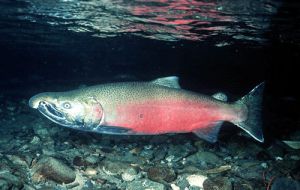MercoPress. South Atlantic News Agency
Japan’s losses open excellent prospects for Chile’s coho salmon
 The coho or Pacific salmon spends most of its life in salt water (Photo by Ernest Keeley)
The coho or Pacific salmon spends most of its life in salt water (Photo by Ernest Keeley) The March 9 earthquake and tsunami destroyed most of Japan’s profitable salmon industry, but Japan’s loss may be Chile’s gain. <br />
The catastrophe directly hit the main fishing areas in the provinces of Aomori, Iwate, Miyagi, Fukushima, Ibaraki and Chiaba, destroying 20% of the salmon industry and completely shutting down fishing ports.
Chile, one of the world’s largest salmon exporters, is also one the few countries, including Japan, that produces and distributes coho salmon, or Pacific salmon, which spend most of their lives in salt water.
The recovering country will most likely look to Chile to make up for their losses, and will begin importing more salmon.
Last year Japan’s salmon industry produced 30,000 tons, forcing the country to import more to meet demands. According to SalmonChile, in 2010 Chile exported 83,000 tons of salmon and 61 tons of trout. Japan received 83% of Chile’s coho exports.
Business managers in the industry are estimating that in the next 12 to 18 months Japan will increase imports to meet demand, and Chile is in a position to meet a large portion of increased demand.
The Chilean industry is still unsure if Japan will wait until 2012 to begin importing, given that the coho’s harvest—which lasts from September to March—is effectively coming to a close this month.
The industry also estimates a rise in salmon prices, which had already begun in first months of this year. Japan was importing salmon from Chile for a steady US$6.10 per kilo for the past two years, however in February that number rose to US$7.40 per kilo.
It also appears that trout demand is growing across the globe, and Japan will also increase trout imports, as have the U.S. and Brazil.
By Amanda Reynoso-Palley – Santiago Times




Top Comments
Disclaimer & comment rulesCommenting for this story is now closed.
If you have a Facebook account, become a fan and comment on our Facebook Page!